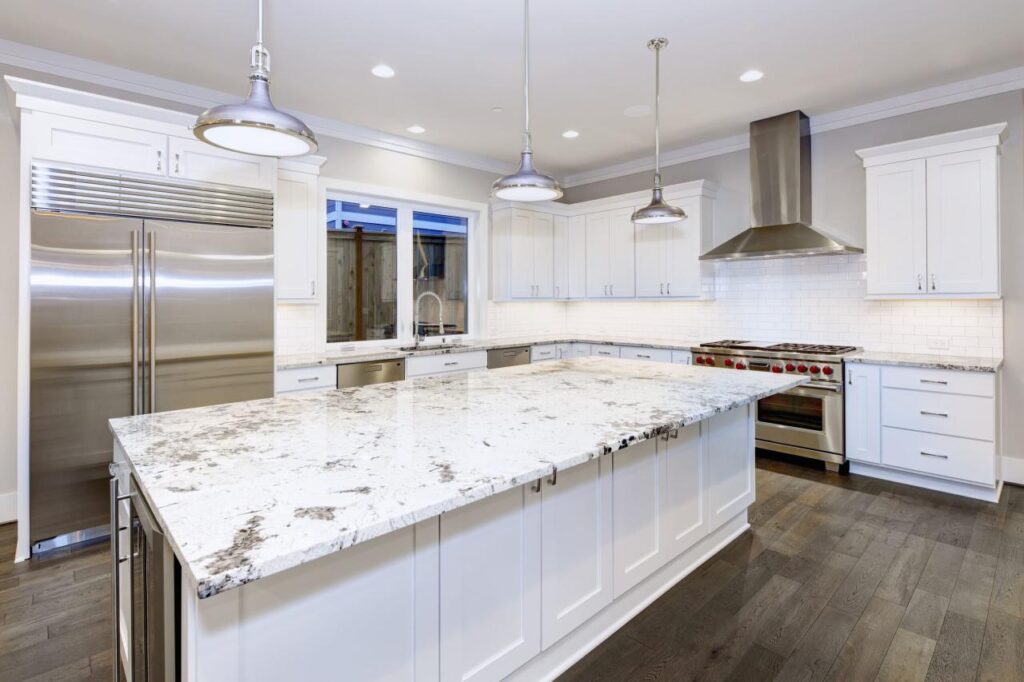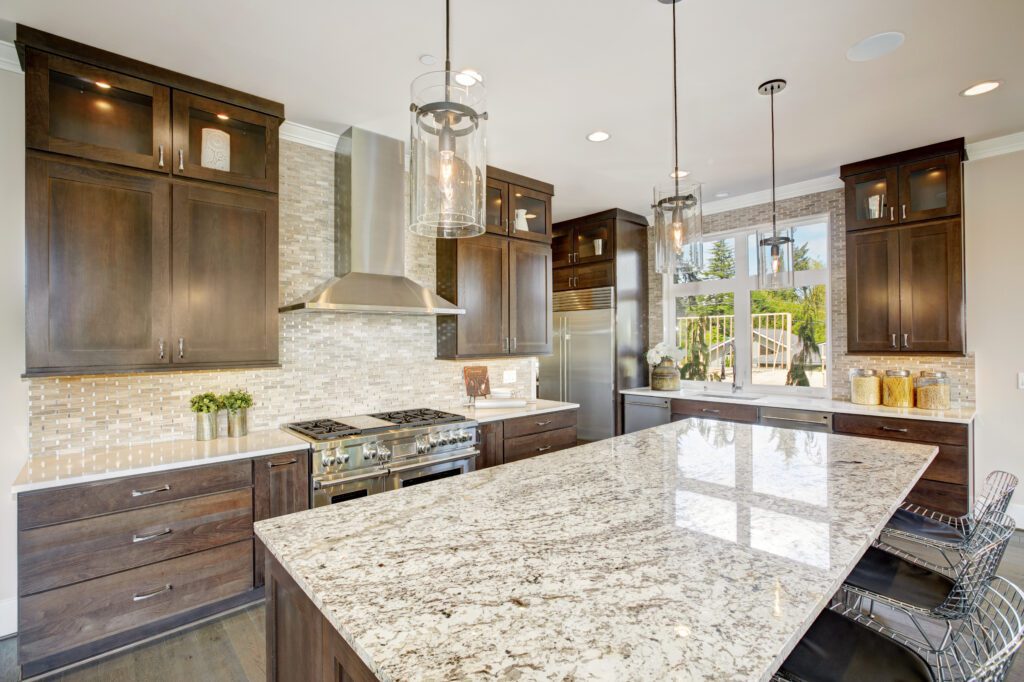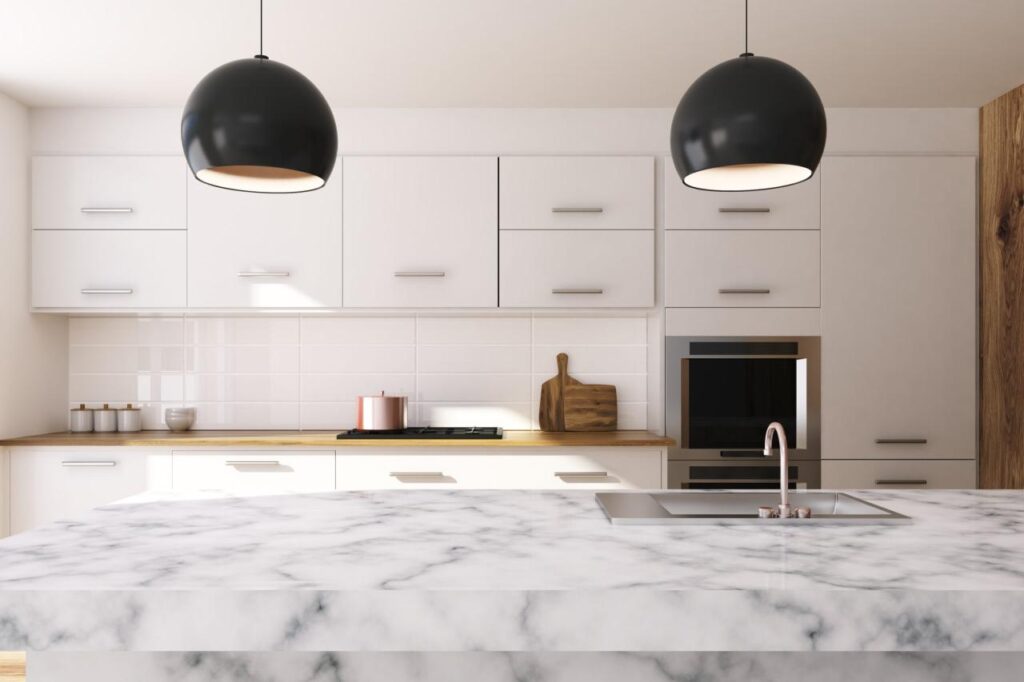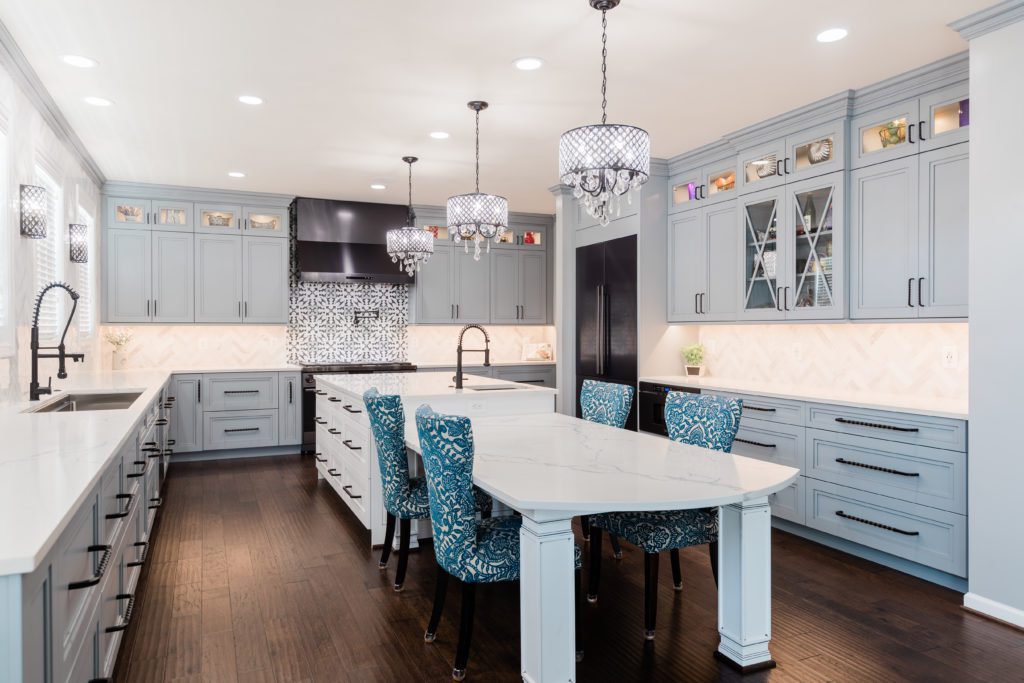Table of Contents
ToggleHow Much Does it Really Cost to Renovate a Kitchen? Find Out Now!
Renovating a kitchen can be an exciting yet daunting task for homeowners. While the end result can be a beautiful and functional space, the costs involved in the renovation process can sometimes be overwhelming. That’s why it’s important to have a clear understanding of the expenses associated with a kitchen renovation project. This article aims to provide valuable insights and tips to help homeowners plan and budget effectively.
When it comes to renovating a kitchen, one of the major costs to consider is the materials and appliances. From cabinets and countertops to flooring and lighting fixtures, these items can quickly add up. However, there are ways to save money without compromising on quality. For instance, opting for pre-owned or discounted materials, or choosing energy-efficient appliances that may have higher upfront costs but can save you money in the long run.
Another significant expense in a kitchen renovation is professional labor and services. Hiring contractors, plumbers, electricians, and designers can be costly, but their expertise is invaluable in ensuring a successful renovation. It’s important to find the right professionals within your budget by getting multiple quotes and checking references. Additionally, obtaining permits and undergoing inspections is essential to comply with building codes and regulations, so be prepared for associated costs.
Design and planning also come with their own expenses. Consulting with designers, creating architectural drawings, and getting 3D renderings can help you visualize your dream kitchen, but these services can come at a price. However, investing in proper planning can save you from costly mistakes and rework in the future.

It’s crucial to be prepared for unexpected costs and contingencies during a kitchen renovation. Structural issues, hidden damages, or changes in project scope can arise, and having a contingency budget in place can help you handle these surprises without breaking the bank. Moreover, you may consider whether to do the renovation yourself or hire professionals. While DIY can save you money, professionals can offer expertise and efficiency, so weigh the costs and benefits carefully.
Financing and budgeting are also important aspects to consider. Exploring different financing options and strategies, prioritizing expenses, and making cost-effective choices can help you stay within your budget while achieving your vision for the kitchen. Additionally, factors like the size of the kitchen, location, desired style, and project duration can impact the overall cost, so keep these in mind.
Lastly, it’s worth considering the long-term savings and benefits of incorporating energy-efficient appliances and sustainable materials into your kitchen renovation. While they may have higher initial costs, they can lead to reduced energy bills and a greener home. Furthermore, a kitchen renovation can increase the value of your home and provide a return on investment. Understanding which upgrades and features tend to yield the highest returns in the real estate market can help you make informed decisions.
In conclusion, renovating a kitchen involves various costs that homeowners need to be aware of. By understanding these expenses and following the tips provided, you can plan and budget effectively for your kitchen renovation project, ensuring a successful outcome that meets both your needs and your budget.
Materials and Appliances
When it comes to renovating a kitchen, one of the major expenses homeowners face is purchasing materials and appliances. From cabinets and countertops to appliances and fixtures, the costs can quickly add up. However, with some careful planning and smart choices, it is possible to save money without compromising on quality.
First and foremost, it’s important to set a budget for your kitchen renovation project. This will help you determine how much you can afford to spend on materials and appliances. Once you have a budget in mind, you can start researching and comparing prices to find the best deals.
One way to save money on materials is to consider alternative options. For example, instead of opting for expensive hardwood cabinets, you could choose a more affordable option like laminate or thermofoil. Similarly, you can explore different countertop materials such as quartz or granite alternatives that offer a similar look at a lower cost.
Another tip is to keep an eye out for sales and discounts. Many stores offer promotions and clearance sales on kitchen appliances and materials, especially during certain times of the year. By being patient and waiting for the right opportunity, you can save a significant amount of money.
Additionally, consider buying materials and appliances in bulk. Purchasing items together from the same supplier or store can often result in discounts or special deals. This can be especially beneficial if you are renovating multiple areas of your kitchen.
In conclusion, while materials and appliances can be a significant expense in a kitchen renovation, there are ways to save money without compromising on quality. By setting a budget, exploring alternative options, taking advantage of sales, and buying in bulk, you can create a beautiful and functional kitchen without breaking the bank.
Professional Labor and Services
When it comes to renovating a kitchen, hiring professional labor and services is often necessary to ensure a successful and high-quality outcome. However, it’s important to be aware of the expenses involved and find professionals that fit within your budget.
One of the main costs associated with professional labor is hiring contractors. Contractors oversee the entire renovation process, coordinating with other professionals and ensuring that everything runs smoothly. The cost of hiring a contractor can vary depending on factors such as the scope of the project and the contractor’s experience and reputation. It’s important to get multiple quotes from different contractors to compare prices and find the best fit for your budget.
In addition to contractors, you may also need to hire plumbers and electricians for your kitchen renovation. These professionals are essential for installing and connecting plumbing and electrical systems, ensuring that everything is up to code and functioning properly. Again, it’s important to get quotes from multiple professionals and compare prices to find the best option for your budget.
Another professional you may want to consider hiring is a kitchen designer. A designer can help you plan and optimize your kitchen layout, choose materials and finishes, and create a cohesive design that suits your style and needs. The cost of hiring a designer can vary depending on their level of experience and the complexity of the project. It’s important to find a designer who understands your vision and can work within your budget.
To find the right professionals within your budget, it’s important to do thorough research and ask for recommendations from friends, family, or other homeowners who have recently undergone a kitchen renovation. You can also check online directories and review websites to find professionals with positive reviews and competitive prices.
Permits and Inspections
When embarking on a kitchen renovation project, it is essential to understand the costs associated with obtaining permits and undergoing inspections. These steps are crucial to ensure that your renovation complies with building codes and regulations, providing you with peace of mind and avoiding any potential legal issues down the line.
Obtaining permits for a kitchen renovation involves submitting detailed plans and specifications to your local building department. The cost of permits can vary depending on the scope of your project and the location of your property. It is important to factor in these costs when budgeting for your renovation.
In addition to the cost of permits, you may also need to undergo inspections at various stages of your kitchen renovation. Inspections are conducted by building officials to ensure that the work being done meets safety standards and adheres to the approved plans. These inspections may include checking electrical wiring, plumbing, and structural changes.
While the costs of permits and inspections can add to the overall expenses of your kitchen renovation, they are necessary to ensure that your project is completed safely and in compliance with local regulations. It is crucial to factor in these costs when budgeting for your renovation and to allocate sufficient funds to cover them.
By understanding the costs associated with permits and inspections, you can plan and budget for your kitchen renovation more effectively. It is always recommended to consult with professionals and local authorities to ensure that you have a clear understanding of the requirements and costs involved in obtaining permits and undergoing inspections for your specific renovation project.
Design and Planning
Design and planning are crucial steps in a kitchen renovation project. They involve various expenses that homeowners need to consider to create a functional and aesthetically pleasing kitchen space. Let’s delve into the details of these expenses and understand their significance.
Consultations with designers are an essential part of the design and planning process. These professionals provide expert guidance and help homeowners translate their vision into a practical design. The cost of consultations may vary depending on the designer’s experience and reputation. However, investing in a skilled designer can ensure that the kitchen design meets your specific needs and maximizes the available space.
Architectural drawings play a vital role in visualizing the final outcome of the kitchen renovation. These drawings provide detailed plans and layouts, enabling homeowners to make informed decisions about the placement of appliances, cabinets, and other elements. The cost of architectural drawings can vary based on the complexity of the project and the level of detail required.
Additionally, 3D renderings have become increasingly popular in kitchen design. These realistic visualizations allow homeowners to see how different design elements will come together before making any physical changes. While 3D renderings can add to the overall cost of the project, they provide a valuable tool for ensuring that the final design aligns with your expectations.
It is important to allocate a budget for design and planning expenses to ensure that your kitchen renovation meets your desired aesthetic and functional goals. By working closely with designers, investing in architectural drawings, and utilizing 3D renderings, homeowners can create a kitchen space that reflects their style and enhances their daily living experience.
Unexpected Costs and Contingencies
Unexpected costs and contingencies are an inevitable part of any kitchen renovation project. It’s important to be prepared for potential unforeseen expenses to avoid any financial surprises along the way. Here are some common unexpected costs and contingencies to consider:
- Structural issues: During the renovation process, it’s possible to uncover underlying structural problems that need to be addressed. This could include issues with the foundation, walls, or flooring. It’s essential to have a contingency budget in place to cover any necessary repairs or modifications.
- Hidden damages: Once you start tearing down walls or removing cabinets, you may discover hidden damages that were not visible during the initial assessment. This could include water damage, mold, or electrical issues. Having extra funds set aside can help cover the cost of repairing these damages.
- Changes in project scope: As the renovation progresses, you may decide to make changes to the original plan. Whether it’s adding extra features or upgrading materials, these changes can increase the overall cost of the project. It’s important to factor in these potential changes when budgeting for your kitchen renovation.
To ensure you have a contingency budget in place, it’s recommended to set aside an additional 10-20% of your total renovation budget. This will provide a financial cushion to cover any unexpected costs that may arise. By being prepared for these contingencies, you can navigate through the renovation process with peace of mind and avoid any financial stress.
DIY vs. Hiring Professionals
When it comes to renovating your kitchen, one of the key decisions you’ll need to make is whether to take on the project yourself or hire professionals. Both options have their advantages and considerations, so it’s important to weigh the costs and benefits to make an informed decision.
DIY (Do-It-Yourself) kitchen renovations can be appealing for those who enjoy hands-on projects and want to save money. By taking on the renovation yourself, you can potentially cut costs on labor and professional fees. However, it’s important to consider your own skills and experience in home improvement projects. Renovating a kitchen requires a certain level of expertise, and if you’re not confident in your abilities, it could end up costing you more in the long run if mistakes are made.
On the other hand, hiring professionals for your kitchen renovation can provide you with the expertise and efficiency needed to ensure a successful project. Professionals have the knowledge and experience to handle complex tasks such as plumbing, electrical work, and structural changes. They also have access to a network of suppliers and can help you source high-quality materials at competitive prices. While hiring professionals may come at a higher cost, it can save you time, stress, and potential costly mistakes.
To make the best decision for your kitchen renovation, consider your budget, timeline, and personal skills. If you have the necessary skills, time, and patience, DIY can be a cost-effective option. However, if you’re looking for a professional finish and want to avoid potential issues, hiring professionals is the way to go. Ultimately, the choice between DIY and hiring professionals depends on your comfort level, budget, and desired outcome for your kitchen renovation.
Financing and Budgeting
When it comes to financing and budgeting a kitchen renovation, there are various options and strategies to consider. It’s important to explore different financing options to determine the best fit for your financial situation. This may include personal savings, home equity loans, or even credit cards. By understanding the pros and cons of each option, you can make an informed decision that aligns with your budgetary needs.
Additionally, creating a budget for your kitchen renovation is crucial to ensure that you stay on track and avoid overspending. Start by determining your overall budget and then break it down into specific categories such as materials, appliances, labor, and design. This will help you prioritize expenses and allocate funds accordingly.
One tip for budgeting is to prioritize essential elements of your kitchen renovation, such as functional appliances and durable materials. By focusing on quality rather than quantity, you can make cost-effective choices without compromising on your vision. For example, investing in energy-efficient appliances may have a higher upfront cost but can lead to long-term savings on utility bills.
Another strategy is to research and compare prices from different suppliers and contractors. This can help you find the best deals and negotiate for lower prices. Additionally, consider repurposing or refurbishing existing items in your kitchen to save money. For example, instead of replacing all the cabinets, you could opt for repainting or refacing them to give them a fresh look.
Lastly, it’s important to have a contingency budget in place for unexpected expenses that may arise during the renovation process. This can help cover any unforeseen issues or changes in project scope without derailing your budget. By planning ahead and being prepared, you can navigate the financing and budgeting aspects of your kitchen renovation with confidence.
Additional Considerations
When planning a kitchen renovation, it’s important to consider various factors that can impact the overall cost of the project. These factors include the size of the kitchen, its location, the desired style, and the duration of the renovation. By taking these considerations into account, homeowners can make informed decisions and effectively budget for their kitchen renovation.

Size of the Kitchen:
The size of the kitchen plays a significant role in determining the cost of a renovation. Larger kitchens typically require more materials, such as flooring, cabinets, and countertops, which can increase the overall expenses. Additionally, larger kitchens may require more labor and time to complete the renovation, leading to higher costs. It’s essential to accurately measure the kitchen and consult with professionals to get an accurate estimate of the materials and labor required.
Location:
The location of the kitchen can also impact the cost of the renovation. Prices for materials and labor can vary depending on the region or city. For example, renovating a kitchen in a metropolitan area may be more expensive compared to a suburban or rural location. It’s important to research local prices and consider any additional costs, such as transportation or permits, that may be specific to the location.
Desired Style:
The desired style of the kitchen can greatly influence the overall cost. Whether homeowners prefer a modern, traditional, or eclectic design, the choice of materials, finishes, and appliances can vary in price. High-end materials and custom-made features tend to be more expensive, while more budget-friendly options can help save costs. It’s crucial to have a clear vision of the desired style and consult with professionals to find cost-effective alternatives without compromising on aesthetics.
Duration of the Project:
The duration of the kitchen renovation project can impact the cost in multiple ways. A longer project timeline may require homeowners to find temporary living arrangements or make alternative meal arrangements, which can add to the overall expenses. Additionally, extended project durations can lead to increased labor costs and potential delays. It’s important to set realistic timelines and work closely with professionals to ensure efficient project management and minimize any additional costs.
By exploring these additional considerations, homeowners can have a comprehensive understanding of the factors that can impact the cost of a kitchen renovation. This knowledge will help them plan and budget effectively, ensuring a successful and cost-efficient project.
Energy Efficiency and Sustainability
When planning a kitchen renovation, it’s important to consider the long-term savings and benefits of incorporating energy-efficient appliances and sustainable materials. While there may be initial costs involved, the investment can pay off in the form of reduced energy bills and a smaller carbon footprint.
One way to improve energy efficiency in your kitchen is by choosing appliances that are ENERGY STAR certified. These appliances are designed to consume less energy without sacrificing performance. By opting for energy-efficient refrigerators, dishwashers, and ovens, you can significantly reduce your energy consumption and save money on utility bills over time.
Another aspect to consider is the use of sustainable materials in your kitchen renovation. For example, you can opt for cabinets made from reclaimed or responsibly sourced wood, which not only reduces deforestation but also adds a unique and eco-friendly touch to your kitchen design. Additionally, using countertops made from recycled materials or natural stone can contribute to a more sustainable kitchen.
Incorporating energy-efficient lighting solutions, such as LED bulbs, can also make a significant impact on your kitchen’s energy consumption. LED bulbs are not only more energy-efficient than traditional incandescent bulbs, but they also last longer, reducing the need for frequent replacements.
When considering the initial costs of energy-efficient appliances and sustainable materials, it’s important to weigh them against the long-term savings and benefits. While the upfront expenses may be higher, the potential reduction in energy bills and the positive environmental impact make it a worthwhile investment.
By prioritizing energy efficiency and sustainability in your kitchen renovation, you can create a space that not only looks beautiful but also contributes to a greener and more sustainable future.
Value and Return on Investment
When it comes to renovating a kitchen, one of the key considerations for homeowners is the value and return on investment. A kitchen renovation has the potential to increase the overall value of your home, making it a worthwhile investment. By understanding which upgrades and features tend to yield the highest returns in the real estate market, you can make informed decisions that maximize the value of your kitchen renovation.

One of the most important factors to consider when aiming for a high return on investment is the quality of materials and appliances used in the renovation. Opting for high-quality, durable materials and energy-efficient appliances can not only enhance the functionality and aesthetics of your kitchen but also attract potential buyers if you decide to sell your home in the future.
Another aspect to consider is the overall design and layout of your kitchen. A well-designed kitchen with a functional layout and ample storage space can significantly increase the value of your home. Features such as an island, custom cabinets, and high-end finishes are often sought after by buyers, making them worthwhile investments in your kitchen renovation.
Additionally, incorporating energy-efficient and sustainable elements into your kitchen renovation can have long-term benefits. Energy-efficient appliances and sustainable materials not only reduce your carbon footprint but can also lead to cost savings on utility bills, making your kitchen renovation a smart financial decision in the long run.
It’s important to note that the value and return on investment of a kitchen renovation can vary depending on factors such as the location of your home and the current real estate market. Consulting with a real estate professional can provide valuable insights into the specific upgrades and features that are in high demand in your area, helping you make decisions that maximize the return on your investment.
In conclusion, a kitchen renovation has the potential to increase the value of your home and provide a return on investment. By considering factors such as the quality of materials and appliances, the design and layout of your kitchen, and incorporating energy-efficient and sustainable elements, you can make informed decisions that yield the highest returns in the real estate market.
Frequently Asked Questions
- 1. How much does a kitchen renovation typically cost?The cost of a kitchen renovation can vary greatly depending on various factors such as the size of the kitchen, the desired level of customization, the quality of materials and appliances chosen, and the location. On average, a moderate kitchen renovation can cost anywhere from $15,000 to $30,000, while a high-end renovation can range from $30,000 to $75,000 or more.
- 2. How can I save money on a kitchen renovation?There are several ways to save money on a kitchen renovation without compromising on quality. Consider keeping the existing layout and plumbing to avoid costly changes. Shop around for materials and appliances to find the best deals. Opt for mid-range options instead of high-end ones. Finally, consider doing some of the work yourself if you have the necessary skills and time.
- 3. Do I need permits for a kitchen renovation?Permit requirements vary depending on your location and the extent of the renovation. In general, major kitchen renovations that involve structural changes, electrical or plumbing work, or additions to the home will require permits. It’s important to check with your local building department to ensure compliance with regulations and to avoid potential fines or issues during the renovation process.
- 4. How long does a kitchen renovation usually take?The duration of a kitchen renovation can vary depending on the complexity of the project and the availability of contractors. On average, a moderate kitchen renovation can take anywhere from 4 to 8 weeks, while a more extensive renovation may take 8 to 12 weeks or longer. It’s important to factor in additional time for design and planning before the construction phase begins.
- 5. Will renovation a kitchen increase the value of my home?A well-executed kitchen renovation can indeed increase the value of your home. Kitchens are often considered the heart of a home and are a major selling point for potential buyers. However, the return on investment can vary depending on the quality of the renovation and the real estate market. Upgrades such as modern appliances, quality countertops, and ample storage space tend to yield higher returns.






